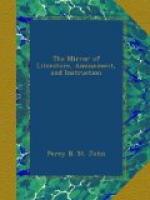* * * * *
ORIGIN OF EPSOM RACES.
(Concluded from page 331.)
“At this period[7] there were many capital thorough bred horses in England, the most celebrated of which were the famed Arabians Darley and Godolphin, from which the best horses have been traced for nearly a century. They produced stock of vast size, bone and substance; and were, at the same time, endowed with such extraordinary, and before unheard of, powers of speed, as to render it probable that some of them have reached nature’s goal, or ultimate point of perfection.
[7] About the fifteenth year of the reign of George II.
“From the former of these horses descended Flying Childers. He is said to have never run a race, except at Newmarket, where he beat, with ease, the best horses of his time.
“In October, 1722, he beat Lord Drogheda’s Chaunter, each carrying ten stone, over a six mile course, for 1,000 guineas. At six years of age, he ran a race, carrying 9 stone 2lbs. against Almanzor and Brown Betty, over the round course at Newmarket, three miles six furlongs, and ninety-three yards, in six minutes and forty seconds! to perform which, he must have moved eighty-two feet and a half in a second of time, or at the rate of nearly one mile in a minute.
“This is the greatest speed yet known of a horse, many have approached, but not equalled it.
“To continue the list of celebrated race horses would extend this article (already it is feared too long) beyond our limits. We will therefore close it with the following account of Eclipse, a horse whom fame ranks second in the list, and whose history is more closely connected with Epsom than those already described.
“Eclipse was first the property of His Royal Highness the Duke of Cumberland, and was foaled during the great eclipse in 1764, from which he received his name. He was a chestnut horse, and at the death of his royal master was purchased by Mr. Wildman, who subsequently sold a moiety, and then the whole of his interest in him, to Colonel O’Kelly, who resided at Clay-hill, Epsom.
“Mr. Wildman is said to have been in some degree aware of the worth of this colt, when a yearling, and to have taken the following measures in order to make sure of him. When he arrived at the place of sale, Mr. Wildman produced his watch, and insisted that the auction had commenced before the hour announced in the advertisements, and that the lots sold should be put up again. In order, however, to prevent a dispute, it was agreed by the auctioneer and company that Mr. Wildman should have his choice of any particular lot; by which he secured Eclipse at the moderate price of 70 or 75 guineas.
“Mr. Lawrence remarks, that previously to Eclipse’s running for the King’s plate at Winchester, in 1769, Mr. Wildman sold the moiety of him to Colonel O’Kelly for 650 guineas, and that O’Kelly subsequently bought the other moiety for 1,100 guineas.




